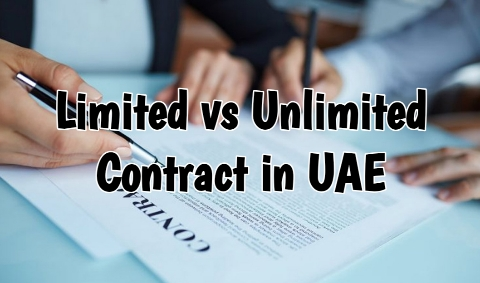Limited vs. Unlimited Contract in UAE 2026

Searching for job opportunities in the UAE but not finding success due to lack of information? If yes, we will share something very important you need to know before starting your career there.
Since the UAE is one of the most popular places among expats for its duty-free system, multicultural work environment, robust financial growth, no language barrier and wide range of job opportunities, it is important to understand the types of employment contracts before starting a job there. This will help you get a clear idea of how long you can work with a company in the future.
Here, we will clearly break down and compare the two types of employment contracts in the UAE.
Types of Employment Contracts in UAE
According to the UAE Labour Law, there are two primary types of employment contracts — limited and unlimited contracts. Each contract define the scope and duration of an employee’s service within a company, outlines specific terms, rights, and obligations for both the employer and employee. Let’s explore these two types of employment contracts in detail to understand how they differ under the UAE Labour Law.
1. Limited Contract
In a limited-term employment contract, the duration of work is fixed for a clearly defined period, it begins and ends on specific dates agreed upon by both parties. This type of contract is usually linked to the employee’s UAE residence visa, which can extend for up to four years. In simple terms, both the employer and employee agree to a set timeframe for employment, and once the duration expires, the contract automatically concludes unless both sides choose to renew or extend it.
Below are some important points included in this contract:
Duration:
This type of employment contract clearly outlines the start and ends dates of employment, ensuring transparency between both parties. As per the UAE Labour Law, such contracts cannot extend beyond four years.
Salary:
Since the employment duration is fixed, the salary also remains constant throughout the agreed period unless both the employer and employee mutually decide on a change. Moreover, before the contract is signed, the end-of-service gratuity amount is clearly stated to ensure transparency and trust between both parties.
Benefits:
Employees working under Limited contracts include benefits such as annual leave, health insurance, and end-of-service gratuity.
Termination:
Once the contract term comes to an end, the employee’s service with the company ends automatically, without requiring any formal notice from either side. However, if there’s a legitimate reason to end the agreement earlier, the contract may be terminated before its expiry — provided both the employer and employee give prior notice as specified in the employment terms.
Workplace:
The workplace location and the nature of the employee’s duties cannot be altered unless both the employer and employee mutually agree to the changes.
Job Switching
An employee under this contract is obligated to remain with the company until the contract period concludes, unless both the employer and employee mutually agree to end it earlier.
Employers typically use this type of contract when hiring employees for specific projects or tasks that need to be completed within a defined timeframe.
2. Unlimited Contract
As the name implies, an unlimited contract does not have a fixed duration. It specifies a start date but no end date — unlike a limited contract. This open-ended structure allows for greater flexibility and simplifies employment management for both the employer and the employee.
The terms and conditions of the contract remain in effect until either party — or both — decide to terminate the employment relationship.
Key points of this contract include:
Duration:
This type of contract specifies a start date but has no defined end date. Its terms and conditions remain in effect until either party chooses to terminate the agreement.
Benefits:
Under an unlimited contract, employees enjoy comprehensive benefits such as health insurance, notice period entitlements, maternity or parental leave, annual leave, and end-of-service gratuity, ensuring long-term stability and security in their employment.
Changes in Employment Terms:
One of the significant benefits of an unlimited contract is the flexibility it offers employees — they can move to another job without waiting for the contract to expire, provided they give proper notice and obtain consent from their current employer. In such cases, the employee’s visa remains independent of the contract.
Furthermore, under the UAE Labour Law, employers may modify certain aspects of employment — such as job terms, salary, or end-of-service gratuity — but only through mutual agreement between both parties.
You may also like: UAE Domestic Worker Gratuity Calculator
Difference Between Limited and Unlimited Contracts
Now that we’ve explored both types of contracts in detail, let’s take a closer look at the key differences that set them apart.
1. Contract Duration
Limited Contract:
As discussed earlier, a limited contract clearly outlines both the start and end dates of employment, with a maximum duration of four years. The terms of this contract are mutually agreed upon and cannot be altered without the consent of both parties. Typically, this type of contract is used for temporary roles or project-based work that requires completion within a specific timeframe.
Unlimited Contract:
This contract does not have a fixed duration — it remains valid indefinitely until both the employer and employee mutually decide to end it.
2. Renewal of the Contract
Limited Contract:
After the contract expires, it can only be renewed if both parties mutually agree to sign a new one. Upon renewal, the existing terms and conditions remain unchanged unless both sides consent to modifications. If the employer decides not to renew the contract, they are required to give notice in accordance with the UAE Labour Law.
Unlimited Contract:
Because this contract has no fixed duration, formal renewal is not required. If both the employer and employee wish to continue their working relationship, they can simply update the existing contract by adding or modifying the relevant terms and conditions.
3. Termination of the Contract
Limited Contract:
In a limited contract, employment automatically ends once the contract reaches its expiry date. However, an employer may also terminate the employee before that date for valid reasons under Article 120 of the UAE Labour Law, which permits termination without prior notice or end-of-service gratuity in specific cases, such as:
(I) Employee misconduct, as outlined in Articles 120 and 88 of the UAE Labour Law.
(II) Failure to perform assigned duties, as stated under Article 121.
(III) Under Article 117, termination must be based on a valid reason, with a minimum notice period of 30 days and a maximum of three months.
Likewise, under Article 121 of the UAE Labour Law, an employee may not resign before the contract expires unless there are exceptional circumstances, such as:
(I) The employer or their representative assaults the employee.
(II) The employer fails to fulfill contractual or legal obligations.
Employees must remember that violating the terms of a limited contract can lead to an automatic six-month labor ban in the UAE. Employers also have the right to restrict employees from joining another company for up to six months for the same reason. Additionally, limited contracts are non-transferable, meaning employees cannot transfer their contract to another employer if they resign before the end of the term.
Unlimited Contract:
Under an unlimited contract, either party may end the employment relationship through mutual agreement, provided that a minimum notice period of one month is given, as outlined in Article 177 of the UAE Labour Law. During this notice period, the employee is entitled to full salary and end-of-service gratuity, and both parties must honor their contractual obligations.
However, if the employee is found guilty of violations under Articles 88 or 120, the employer has the right to terminate the employment without prior notice or gratuity. Similarly, under Article 121, the employee may resign without notice if certain exceptional conditions apply.
If the employer prevents the employee from completing the notice period for reasons not covered under Article 120, the employee remains entitled to receive full pay for 30 days.
Unlike limited contracts, employees under unlimited contracts enjoy greater flexibility, as they can transfer to another employer freely without facing any restrictions or labor bans.
4. Compensation
Limited Contract:
In the event of termination or resignation, both the employer and employee are entitled to compensation as outlined in the UAE Labour Law.
If the employer terminates the employee without a valid reason or fails to provide notice (as stated under Article 120), they are required to compensate the employee with either three months’ salary or the remaining duration of the contract, whichever is shorter.
Likewise, if an employee resigns voluntarily or without serving the notice period (under Article 121), they must compensate the employer with 45 days’ salary or the remaining contract period, whichever is less.
Unlimited Contract:
If either party decides to end the employment relationship without a valid reason or notice period, they are required to pay compensation equal to 30 days’ salary.
This rule remains applicable even when the termination occurs through mutual agreement, provided that the 30-day notice period has already been served.
5. End-Of-Service Benefits
Employees working under both limited and unlimited contracts are entitled to receive end-of-service benefits, commonly referred to as the UAE gratuity. They can also calculate their Gratuity here.
The gratuity amount is calculated based on the employee’s length of service and basic salary, while allowances, bonuses, and other additional benefits are excluded from this calculation.
6. Implications for Employees
Limited Contract:
The biggest drawback of a limited contract is the lack of job security.
Once the contract expires, if the employer decides not to renew it, the employee must look for a new job.
Moreover, if the employee resigns before the contract period ends, they may face penalties and lose their eligibility for end-of-service gratuity.
Unlimited Contract:
The greatest advantage of an unlimited contract is enhanced job security.
Employees are safeguarded against termination without a valid reason under the UAE Labour Law.
They can continue their employment as long as they fulfill their responsibilities and maintain satisfactory performance as expected by the employer.
7. Implications for Employers
Before hiring employees under either a limited or unlimited contract, employers in the UAE should carefully consider a few key factors.
Notice Period:
As outlined in the UAE Labour Law, both types of employment contracts require a defined notice period if either party intends to terminate the employment relationship.
Renewal:
In a limited contract, the employment duration is predetermined, requiring the employer to decide at the end of the term whether to renew or terminate it.
In contrast, an unlimited contract has no specific end date and continues indefinitely until both parties mutually agree to terminate the agreement.
Visa Cancellation:
In the UAE, an employee’s residence visa is linked to their employment.
Therefore, when a contract ends or is terminated, the employer must cancel the employee’s visa within a specific timeframe.
The visa cancellation process depends on the type of contract and must be done carefully to avoid any legal complications.
When terminating any contract, employers must follow the procedures outlined in the UAE Labour Law.
Failure to do so may result in legal action from the employee.
Conclusion
Under the UAE Labour Law unlimited contracts each serve a purpose. A limited contract is tailored to short‑term or project‑driven work whereas an unlimited contract tends to provide flexibility and a secure long‑term position. When the mechanics of each type are clear both employers and employees can make choices steer clear of legal entanglements and sustain a fair balanced working relationship, across the Emirates.






